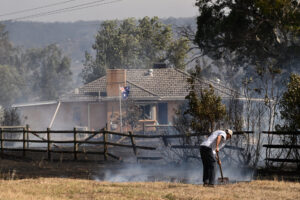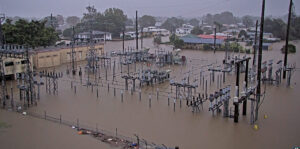As Sweden debates how best to get out of the coal mining business, Australia is debating how best to subsidise the world’s largest export coal mines. Just last week the Australian Federal Government approved the enormous Adani/Carmichael coal mine which, at 40 kilometres long and 10 kilometres wide, is bigger than Gothenburg. The Australian Government has repeatedly signalled its willingness to financially support the project.
If built, the Adani/Carmichael mine would produce more than 2 billion tonnes of coal over its life. That’s enough to make a road of coal 10 metres wide, 1 metre deep and 200,000 kilometres long. Long enough to wrap around the world 5 times.
The determination of Australia to press ahead with such mines as the world prepares for the next round of climate talks in Paris has promoted the President of the small pacific island state of Kiribati to write to all world leaders asking them to join him in calling for a moratorium on all new coal mines. So far 11 other countries and voices as diverse as Sir Nicholas Stern and Naomi Klein have signed up.
Prime Minister Lofven currently has President Tong’s request for help in his in-tray. If he agrees that Sweden will join the call for a global moratorium on new coal mines he would be the first European leader to do so. If he rejects the call then he would be turning his back on a small county in desperate need.
Kiribati only has a population of only 100,000 people, the size of Helsingborg, but that entire population may need to find a new home in the coming decades as they live on one of the lowest lying countries in the world. Even the two 2 degrees of global warming that so many ‘pragmatists’ are now willing to accept will see large parts of Kiribati submerged or made unliveable.
While the Adani/Carmichael coal mine is bigger than the biggest island of Kiribati, and the coal it produces will generate more emissions each year than Sweden, it is only one of 50 new coal mines proposed in Australia. Put simply, it is impossible to start the ‘transition’ away from fossil fuels until we stop building enormous new coal mines.
By preventing a flood of new coal supply from entering the world market a moratorium on new coal mines will stop the price of coal falling further. In turn a moratorium will improve the economic case for investing in renewable energy rather than new coal fired power stations in the rapidly growing countries of South East Asia.
Since world leaders first agreed to tackle climate change back in 1991 world coal production has risen by 50 per cent. Australia, which has a larger share of the world traded coal market than Saudi Arabia has of the oil market, is planning to double its coal exports. Put simply, if Australia succeeds in its coal export ambitions the world will fail in its climate ambitions.
There is much that Swedish citizens and the Swedish government can do to help reduce the emissions they are directly responsible for, but there is also much that Sweden can do on the global stage to send a clear signal about the direction that the world needs to head. The faster the world phases out coal mines and powers stations the better, but the world can’t start to move forward until countries like Australia stop driving it backwards.
President Tong and the people of Kiribati are asking for help. Regardless of disagreements within Sweden about how fast your nation should be moving forward, surely all Swedes agree with the people of Kiribati that it’s time to stop going backwards. As we say in Australia: the best thing to do when you are in a hole is to stop digging.
Dr Richard Denniss is Chief Economist at The Australia Institute, a policy think tank. He is visiting Sweden to discuss the need for a moratorium on new coal mines www.nonewcoalmines.org.au @RDNS_TAI
Related documents
Between the Lines Newsletter
The biggest stories and the best analysis from the team at the Australia Institute, delivered to your inbox every fortnight.
You might also like
Why a fossil fuel-free COP could put Australia’s bid over the edge
When the medical world hosts a conference on quitting smoking, they don’t invite Phillip Morris, or British American Tobacco along to help “be part of the solution”.
Burning homes and rising premiums: why fossil fuel companies must pay the bill
Another summer, another round of devastation: homes lost, communities evacuated, lives upended.
Climate crisis escalates cost-of-living pressures
A new report has found direct connections between the climate crisis and rising cost-of-living pressures. Failure to lower emissions now will only aggravate the crisis, with each moment of inaction compounding the pressure on households.



